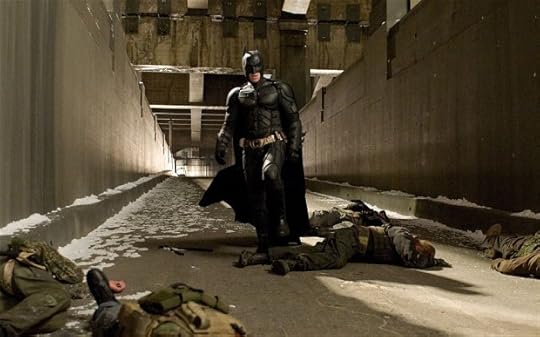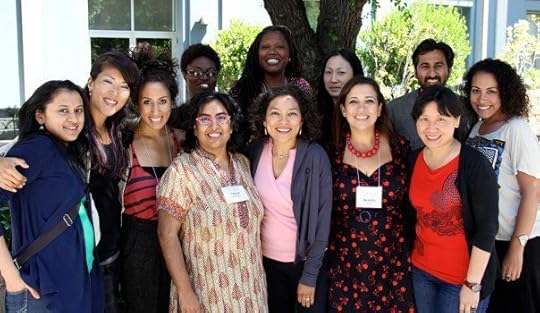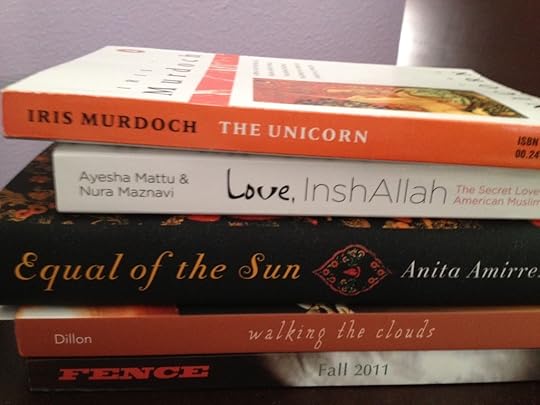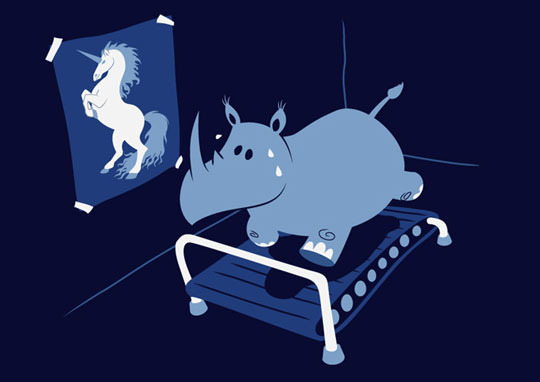Minal Hajratwala's Blog, page 5
August 1, 2012
Writing the Sixth Sense
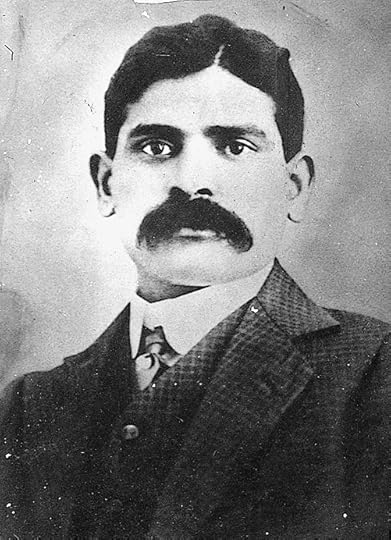
Someone on a Facebook thread today asked about how to cultivate her psychic powers, as a way of connecting to her ethnic heritage.
I felt compelled to pipe in since, as readers of Leaving India know, my great-great-grandfather Motiram (at left) was reputed to be psychic.
At the risk of sounding woo-woo to some people, I’ll say that in writing intimately about my long-gone ancestors, I found it extremely helpful to develop my own spiritual relationships and connections. So I said:
For me, writing really helps the most. Keeping a dream journal. Writing questions just before sleep, then being ready to write answers if they are present when I wake up. Nurturing my imaginative space with images, metaphors, beauty, experiences in nature, art. Developing a personal metaphorical language so that I know what stuff “means” to me. Like, if you know a certain color resonates — or images, or gems, or a tarot image — try carrying it around or wearing it or looking at it every day for a week/month — inviting it in and getting to know it. What happens if I wear red every day for a month, what energies shift around me? Or blue? Taking notes/noticing that sixth-sense level of reality as much of the time as I can. Squinting, peeking, peering, opening my eyes (+ 3rd eye) to see what others don’t see/say.
Writing is a psychic power, after all. So is art-making. Care-taking. Loving.
Activism, too. Later this week, I’m teaching a writing workshop as part of a five-day camp for young South Asian American activists. We’ll work on cultivating the sixth sense: Seeing what others can’t or won’t see. Developing the resilience to keep on looking, witnessing, speaking out. Learning to articulate a new vision. Scrying into the future, toward a better world that we believe can exist, with our own earnest vision.
I think that’s better than all of Bruce Wayne’s paramilitary-industrial-complex “superpowers.”
July 17, 2012
Why self-care matters for writers
Sometimes people tell me it must have taken “a lot of discipline” to spend seven years writing a book.
Nah. I hate the word “discipline.” It sounds like torture to me: the helpless writer handcuffed to the keyboard! eschewing all forms of pleasure! in the service of the Great Puritan God of Literature!
Ick, ick! I don’t want to live in a nunnery, subsisting on dry breadcrusts and water which I have to share with the skinny white mice who are my only companions behind iron bars of penitence.
I prefer my writing hours to be fueled by enthusiasm, desire, excitement, joy, great food, treats, an inspiring environment, and/or an urgent need to figure everything out.
Of course, it doesn’t always work out that way. My seven years were a kind of self-torture: I got stuck and blocked, I tried to handcuff myself to the desk, I cursed and got up and did loads of laundry instead — and I filled my cup with self-loathing as I wished that I had what real writers must have, that golden halo called “discipline.”
Through all that, I learned some things — about writing, and mostly about myself.
I learned that yes, writing is tough. There is a reason that more people “want to write” than actually do write. But that reason isn’t what I’d thought.
Many of my coaching clients come in saying something like, “I’m just lazy, I have the time and I have the space, I don’t know why I don’t write…”
I know why.
It’s not the straw man we call “laziness,” nor its cousin, “lack of discipline.”
What’s causing them, or me, to freeze up before we even begin is fear.
For this ailment, I don’t prescribe discipline. I urge extreme self-care.
Clients often don’t want to hear this. They fear that if they go too soft on themselves, they’ll never get anything done. What they need, they think, is discipline.
This might be true for something like, say, a cardio workout. (I wouldn’t know — heh.)
For writing, I learned the hard way that the opposite is true. The idea of Discipline, far from helping me make progress, trapped and stunted me.
The more we push, the less chance we have to flower.
If a seed is given good soil and plenty of water and sun, it doesn’t have to try to unfold, it doesn’t need self-confidence or self-discipline or perseverance. It just unfolds. It can’t help unfolding.
If a seed has to grow with a rock on top of it, or in deep shade or without enough water, it won’t unfold into a healthy sized plant. It will try — hard — because the drive to become what you are meant to be is incredibly powerful. But at its best it will become a sort of ghost of what it could be. In a way, that’s what most of us are.
—Barbara Sher, *Wishcraft*
Now I don’t strive for “discipline.” When I’m terrified, I work on the fear. I try to write into it — toward, not away from, what’s scariest. I trust that as I begin to move through fear, I’ll have no trouble putting in the hours. When I am juiced, it’s hard to tear myself away for things like, you know, meals. Or people. Or even laundry.
Now I believe in nurturing not only the writing, but also the writer.
Learning to be gentle with myself was the best gift of my seven years of “discipline.”
July 16, 2012
Summer Reading for Memoirists
Sparked by request from my fantastic memoir students of VONA 2012 … What memoir and creative nonfiction books juice you?
Memoir about other people
Autobiography of My Mother by Jamaica Kincaid
My Brother by Jamaica Kincaid
Does Your House Have Lions by Sonia Sanchez — actually a poetry book of linked poetry centering around her brother’s death of complications of AIDS; weaves different family/ancestral voices
The Bishop’s Daughter by Honor Moore — a woman writes about being the bisexual daughter of a closeted gay bishop; silences in the family
Who She Was: My Search for My Mother’s Life by Sam Freedman — totally research-based with personal reflection only at the beginning and end; great model for the kinds of research you can do for memoir
Fun Home by Alison Bechdel — graphic novel format, memoir about her father
Memoir with landscape/location as a character
Volcano: A Memoir of Hawai’i by Garrett Hongo
Epitaph for a Peach by David Mas Masumoto
Running in the Family by Michael Ondaatje
Talking to High Monks in the Snow: An Asian American Odyssey by Lydia Minatoya
Memoir with relevant content for some folks
Books of the other VONA teachers, obviously — especially Elmaz Abinader and Faith Adiele for political/international content
The Year of Magical Thinking by Joan Didion — on death and grief
The Long Journey by Natalie Goldberg — on grief, multiple losses of marriage/father/zen teacher
Lakota Woman by Mary Crow Dog — this is more in the older genre of autobiography rather than what we think of as a modern literary memoir — on surviving battle/genocide
Night by Elie Wiesel — sparse and fragmented narrative of a teenage boy caring for his father in Nazi concentration camps 1944-45
One! Hundred! Demons! by Lynda Barry — graphic memoir; monsters from childhood trauma
Narcopolis by Jeet Thayil — not a memoir, actually, but read for the mesmerizing passages of drug use/hallucination/disassociation
Outdated: Why Dating is Ruining Your Love Life by Samhita Mukhopadhyay — feminist deconstruction of dating, with some memoiristic content
Nonfiction with experimental/interesting structure
The Emigrants by W.G. Sebald — on the line between fiction and nonfiction, structured as 4 biographies but they add up to something amazing; impact of a historical trauma many decades afterward
A Chorus of Stones: The Private Life of War by Susan Griffin — stunning poetic political memoir/ feminist meditation that moves across many locations and timeframes
“Exterminate All the Brutes”: One Man’s Odyssey into the Heart of Darkness and the Origins of European Genocide by Sven Lindqvist — gorgeous first-person fragmented memoir/travel narrative/political critique/meditation on history
Calamities of Exile: Three Nonfiction Novellas by Lawrence Weschler — biographies of refugee-artists
Prose by poets
Soldier: A Poet’s Childhood by June Jordan
The Winged Seed: A Remembrance by Li-Young Lee
Bhanu Kapil — all of her books (prose/poetry) are beautiful models with interesting structures; she teaches at Naropa; her blog http://jackkerouacispunjabi.blogspot.com/ (also, for those interested in experimental and cross-genre writing, Naropa in Colorado is a good place to check out for summer workshops and MFA)
Old-school powerful biomythographies from women of color
Everyone, but especially any woman of color in America writing a memoir, should read these — they are our canon:
Zami: A New Spelling of My Name by Audre Lorde
The Woman Warrior: Memoirs of a Girlhood Among Ghosts by Maxine Hong Kingston
Borderlands/La Frontera: The New Mestiza by Gloria Anzaldua
Other resources
Kristina Wong, one-woman show “Wong Flew Over the Cuckoo’s Nest” — comedic show about being Chinese-American and mental illness
Trauma Stewardship: An Everyday Guide to Caring for Self While Caring for Others by Laura van Dernoot Lipsky and Connie Burk — on working through & with trauma, one’s own or other people’s
Writing Down the Bones and Wild Mind by Natalie Goldberg — books by on freewriting and writing as a practice
The Artist’s Way by Julia Cameron — the best practical guide for writers and artists
*
Gratuitous photo of my summer reading, taken with my new iPhone:
July 11, 2012
A book is not a tweet (or: Rewriting)
I have been following my friend Mary Anne’s excellent blog which, amazingly, she is keeping up while on an artists’ residency. Today she posted about realizing that she might need to totally rewrite many passages in her work-in-progress: ”The somewhat mindless drudgery and exactitude that is also part of making art.”
I wrote this comment on her blog (and then realized I have even more to say about this):
I went through 20-30 drafts of every chapter of my book. It seems incredible to me now, and somewhat insane, but really I couldn’t have let it go any other way. And it got way better every single time. I’m judging a literary prize now, reading back-to-back fiction, and I *really* wish some of these authors had gone through their book at the finetuning-the-language level a couple more times. The comparison with visual artists (& musicians, etc) is a good one. It can be exciting to get fast about writing, especially when kicking out those early drafts (yay word count! thousands! tens of thousands!). And all of us do so much casual writing, blogging, emails, whatever, that it’s easy to get a bit casual about it, I think. But a book is not a tweet  … I’m so happy you have the time to sink into your writing right now. It’s making me remember what is so fantastic about a residency, and long for some residency time myself!
… I’m so happy you have the time to sink into your writing right now. It’s making me remember what is so fantastic about a residency, and long for some residency time myself!
When I’m teaching, I try to get students to freewrite, nice and fast and easy — letting go of inhibitions. I do most of my first drafting longhand, freewriting, just like that. For beginning writers, and for any writers beginning something, it feels like a fantastic way to work. I loved the experience of drafting 50,000 words of my novel in a single November — what a rush!
But later everything slows down. When I’m lucky it’s not stuck, mucky, yucky, muddy, confused slow — but sweet, afternoon light, chocolate sauce, lazyday, lovemaking slow. That’s the juicy part of my process: rewriting, writing over the old scripts, finding connections, making new leaps. Getting my fingers into the text. Moving a section, a paragraph, a sentence. Moving it again. Finding a better word. Finding the best word.
Because I do this work so slowly, I sometimes have to wrestle my inner Productivity Monster, who — shaped by Capitalism — has a definite preference for the ever-climbing word count. (“WHAT? We’re taking OUT words now? But that’s a minus … a deficit … oh no the word count is going in the RED! Just like the stock market! What if we lose the house??”)
So I love the (possibly apocryphal) story about Flaubert who, when asked how his work was going, is said to have replied, “Wonderful. I spent the morning putting in a comma — and then I spent the afternoon removing it.”
To me that doesn’t feel like drudgery. It’s the definition of luxury.
Gustave Flaubert (1821-1880), post-Madame Bovary
July 9, 2012
Update on Werewolves
Today I was very happy that the internets gave me a new, hip poem with the above title by one of my favorite authors: here.
This is awesome because:
(1) It’s an update on werewolves, ok? Yeah. By definition: awesome.
(2) The author, Margaret Atwood, is 72 years old, has 332,495 Twitter followers right this minute, and has published 13 novels + 15 poetry collections + a bunch of other books — and she is Trying New Technologies that I have never heard of. (Meanwhile, I may still be too tech-skeered to get an iPhone.) This poem, for example, is on a new self-publishing platform/community called WattPad.
Most people know Margaret Atwood as the author of The Handmaid’s Tale, which became a film starring Faye Dunaway and Robert Duvall.
She is an awesome writerly role model for me because she writes fantastic, super-popular, feminist, subversive novels, many of which are set in alternate realities. I was talking about Atwood earlier today to a client who is writing an awesome speculative fiction novel. (Beloved client: the books I was telling you about are Year of the Flood and Oryx and Crake, and I was thinking of the storyline involving the God’s Gardeners, a small community of survivors of a planetary biological catastrophe.)
That is all for now, except:
Yes, I am aware that I say “awesome” more than the average citizen of the planet. This is because I am an American, unlike Margaret Atwood who is Canadian. Canadians, by the way, are awesome, eh?
Hope you, dear reader, have an awesome day, and do watch this if you have a couple of minutes to get pleasantly spooked:
Book trailer for Wolf Girls: Dark Tales of Teeth, Claws, and Lycogyny (2012)
June 23, 2012
Summertime Sale: Perfecting Your Proposal
Are you sweating over a grant proposal, project description, business document, or artist statement? I can help! I’m running a special offer that includes both strategic advice and detailed line editing of your important document, up to five pages (perfect for Fulbright applicants). You can use my services at any time — no expiration date — as long as you book and pay before July 15, 2012.
The awesome deal:
For just $310, you can get a jump on those fall deadlines AND make your summer more relaxing with:
a content edit of your first draft, including comprehensive written feedback that you can refer to later as you revise (normally $100 for 5 pages);
two half-hour coaching calls with me (normally $120 per hour); and
a content edit of your second draft, OR a triple-read line edit to polish your final draft (normally $150 for 5 pages).
That’s $310 for a $430 value — a savings of nearly 30%.
Why?
As a professional editor with two decades of experiences, I’ll listen to your ideas, help you identify the best way to present them, and then make your prose perfect. I’ve successfully created grant proposals for multimillion dollar projects for various agencies. My proposals for my own projects have earned me a six-figure book deal, career promotions, artist residencies, and multiple fellowships including a Fulbright. Most importantly, I love uncovering the gems in your ideas so that your proposal is not only compelling and correct, but also irresistible.
Ready to save time, money, and effort?
Fantastic! Just send $310 via Paypal to hajratwala [at] gmail [dot] com, and then email me with your project details and deadlines. I’m excited to work with you. Don’t forget to lock in this special discount rate before July 15!
Questions? Not sure?
Ask me whether working with me would be right for your proposal. Just tell me a little about your idea and yourself, and we can go from there.

Thinking global?
If your project involves international travel, why not consider a Fulbright? It’s not just for academics, so check out Everything I know about YOUR Fulbright chances and see if you could qualify! Deadlines are in August and October.
Wishing you a wonderful summer,
Minal
May 29, 2012
Project creep — or, the saga of the ever-expanding fruit salad
As a consultant, I’m always hypervigilant about “project creep.”
I try to gain a clear idea of the client’s needs, write my scope of work accurately, and get everyone to agree up front that apples, oranges, and cherries are part of the project — while mangos, guavas, and dragonfruit most definitely are not.
But sometimes, despite everyone’s best efforts, a project just grows. And expands. There are kumquats, after all; those are just weird little oranges, right? What about pluots? We forgot to account for pluots. And before you know it, you’re putting in double the hours for the same amount of money.
Recently, I turned in what I thought was a near-final product, about 40 pages of material, with just some fine-tuning left to work out. The client disagreed, and shared with me a sample of the document they’d wanted — twice as long, and nothing like the model documents I’d been given at the beginning.
Well. I confess, I definitely had my moment of Grrr.
But because it was an honest misunderstanding, and because I’d already put in too much work to pull out, and because I trusted their intentions, and because I believed in the work they were doing and was hoping for a longterm relationship, I agreed to complete the extra work at the same fee. Even though I knew it would take many, many more pages and hours than we’d estimated.
I delivered their material last week: 150 pages of writing, mostly original, including various worksheets, case studies, and so on.
It was, if I say so myself, a fantastic fruit salad. I believe there were even pomegranate seeds.
We scheduled a final project meeting.
Then I waited.
Now, any writer who’s turned in something — whether it’s a manuscript, a hack job, or even just what you hope is your cleverest Facebook status update ever — knows the feeling of waiting for feedback. I’ve gotten used to it over the years, and it’s no longer that nail-biting, bed-of-nails feeling. But there’s always some trepidation. A writer never really knows, after all, until a reader clicks “Like.”
At the meeting, the firm’s founder told me how delighted she was with the work. It was fantastic, she said. She couldn’t wait to start using the documents for the business. She definitely wanted to work with me on other projects, and we talked about the exciting things coming up on her plate.
Then she asked me how much time I’d put in to create her gorgeous fruit salad. I told her honestly.
And right there, she decided to pay me a third more than our agreed-upon fee.
I must have been grinning like a fool. Because when does that ever happen to a consultant? Umm, pretty much — never? In nearly 12 years of various kinds of freelance and consulting work, it’s never happened to me before. More often (thankfully, not too often for me — I’ve had it happen to consultant friends frequently, though) a client will receive an invoice and start nitpicking: Did we really need that mint leaf garnish? I’m not sure I meant to pay for both strawberries and raspberries…
What it means for our relationship is that this client now at the top of my priority list. I’ll think of freebies to send her when I can. And even when I’m juggling jackfruit, I’ll try to say yes to her need for a handcrafted organic plum ceviche.
OK, that fruit metaphor is getting … overripe. (Bwahahahah! Sorry!)
But anyway, my point is:
1. I’m happy and grateful to have such clients to work with. It makes up for the ones who haven’t paid their invoices for … um … so long that I’d have to go look it up.
2. I’m left thinking, When was the last time I treated a collaborator so well? Who’s gone overboard, put in overtime, and worked her a** off just to help me? Have I said thanks — or a little more than thanks?
Fruit for thought.
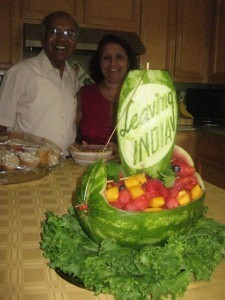
My parents posing with the fruit salad that my father carved when my first book came out in 2009. Thanks, Pappa!
March 20, 2012
Our own writing time-zones
My writer friend Mary Anne posted on her blog about waking up at 4am from bad dreams and then … writing!
I am inspired at how often she does this. She wakes up with way too little sleep — crying babies, nightmares, whatever. She stresses about it for maybe a paragraph.
And then? She gets right to work.
By contrast, here's what I do: Whinge that since I didn't get enough sleep, my brain is so tired that I *can't possibly* do anything on my to-do list, let alone accomplish something so strenuous as to *write*!
But wait… now that I think about it, that's a little too self-deprecating. Hey, little inner critic, shaddup! Actually, that's not fair at all!
I do write instead of sleep. I just do it on the late end. Quite often, I either work into the wee hours, or I sleep a few hours and then am awake from, say, 2am-5am. (The BBC says being awake in the middle of the night was totally normal, pre-electric-lights, and could actually be good for you.)
There is something precious and magical to me about those quiet hours when no one else is awake. It's the feeling of being a kid, staying up way past bedtime. It reminds me that writing is nothing like a "day job"; it's a party. Hey, look, everyone, I'm getting away with something!
I admit, though, I do envy the cred of morning people. It seems so much more virtuous to wake up before dawn and start milking the cows, doesn't it?
Sleep in till noon, and it's hard to convince anyone — let alone my smartass little inner critic — that I'm working my a** off.
But I am. I'm just on another time zone. Maybe Moscow, or Argentina?
How do you balance sleeping vs. creating?
What's your writing time zone?
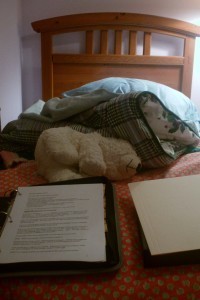
We work hard around here!
January 31, 2012
Unicorn news
In my continued quest to assuage my guilt about not blogging more (while not actually writing real blog posts), I am posting a link to a lovely article that captures what I'm doing in India and working on these days. Thanks to reporter Sravasti Datta for getting it right … and putting my queer unicorny interests in a mainstream newspaper!
January 16, 2012
A quickie update
Too busy to blog lately!
I've been in Bangalore since December, writing and enjoying the city; did a fantastic reading here last weekend with visiting poet Kazim Ali; and am off to the Jaipur Literary Festival, where I'll be moderating a conversation with gay writers Hoshang Merchant and R Raj Rao. (If you're at the festival, join us: 2:30pm Friday!)
I am super lazy about blogging these days so here are some other blogs to entertain you, at the website blogadda.com, which has a zillion Indian blogs linked into it (including me):

Happy new year! (Yea, I know, it's not that new anymore.)

